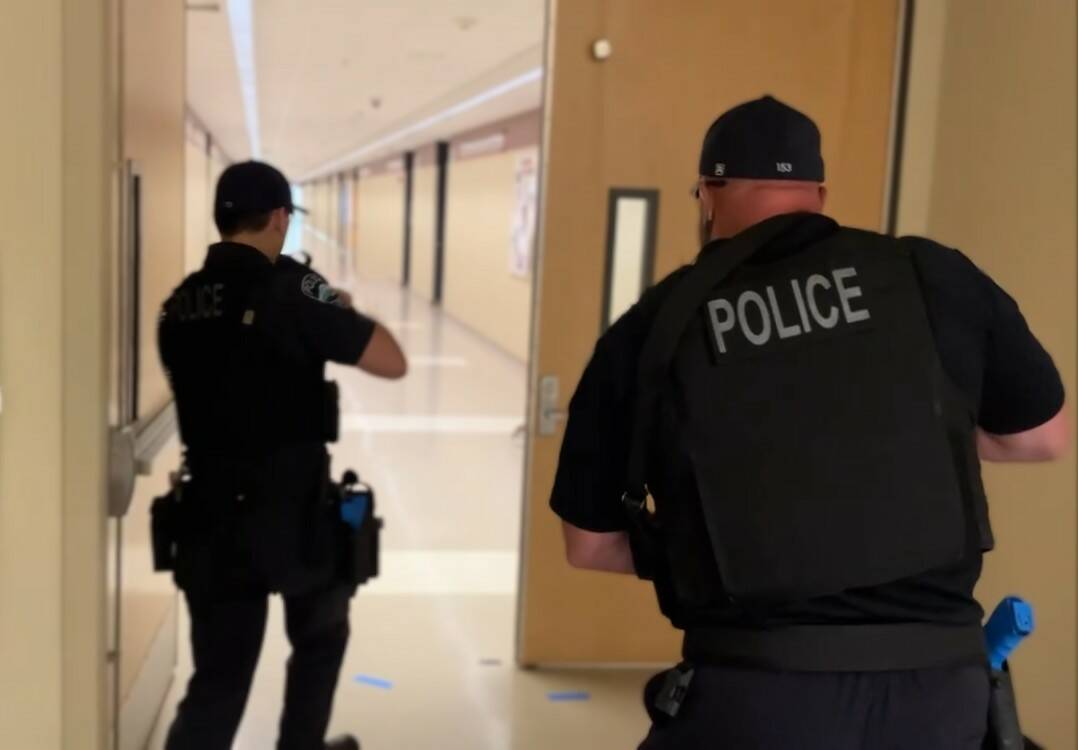Hands-on, realistic training is invaluable and priceless for members of the Mercer Island Police Department (MIPD), especially when it occurs within the walls of Mercer Island High School (MIHS), according to police and school district representatives.
For two days in July, the entirety of MIPD’s force participated in active shooter training and emergency drills at MIHS, utilizing blanks and training munitions while volunteers posed as suspects and victims.
“If we can drill realistically, we have a higher chance of responding to an event more successfully, of course,” said Lindsey Tusing, MIPD public information officer, who added that it’s crucial to conduct training in the actual building where an incident might transpire.
It’s a vast building with copious sections, so it’s important for officers to get the lay of the land, according to Tony Kuhn, the school district’s director of maintenance and operations. Kuhn played an integral role in the training by opening the buildings to the police department, according to Tusing.
Kuhn said the thorough training went well and featured two three-hour sessions on July 11-12. The sessions were led by officer Lee Tortorelli and also featured the city’s Emergency Management Department.
“I want to be able to better understand their response and what types of things they were looking for, what types of things could we do better as a district that could help them in certain situations,” Kuhn said of the pair’s continued partnership that also features various types of training, programs and initiatives focused on the safety and security of the school district’s students, staff and buildings.
Emerging from the training, Kuhn said adjustments the district can make to improve response time are posting wayfinding signs in the halls and classroom numbers inside of rooms to aid officers who are responding to an incident and need to apprise dispatch of their location.
In addition to joining the police and fire departments in lockdown and fire drills over the years, Kuhn said the district’s plan involves year-round training that includes evacuation exercises and more.
Tusing said the department and district take the drills very seriously and thinks everyone was grateful to be involved.
HOMELAND SECURITY, FEMA TRAINING
In other training news, Tusing participated in a mock mass casualty event from July 10-14 with the Federal Emergency Management Agency (FEMA) in partnership with the Department of Homeland Security in Wheaton, Illinois.
The Advanced Public Information Officer (APIO) training featured robust classroom instruction involving strategizing communications plans for disasters or public safety incidents, such as active shooter occurrences, flooding, wildfires and more. Outside of the classroom, Tusing and her fellow public information officers partook in highly realistic mock drilling for disasters, which included strategizing and responding to the developing scenario.
“It’s becoming more and more critical that organizations have a highly trained individual who is comfortable and confident in their ability to communicate vital information to the public, to get the right information to the right people so they can make the right decisions,” said Tusing, adding that her job also involves building public trust in the 95% of the time before a disaster or emergency may occur.
Residents and city officials need to engage in the crucial elements of emergency preparedness and communication in this realm, she noted. Tusing also encourages residents to sign up for emergency alerts on social media platforms, subscribe to city newsletters or inquire about receiving email notifications through the school district.
“That helps us help each other, and it helps us respond to a community that’s better prepared,” she said.
Tusing returned to the Island after the training feeling even stronger about her critical role in the community. She possesses an educational background in communications and worked as a 911 dispatcher for a decade, which makes her extremely familiar with emergency management and response.
“We want to hammer home the importance of how seriously we take all of these types of trainings to make sure that we have the best, most capable people on our force. Not just when the big disasters occur, when we face public safety hazards, but just year-round,” Tusing said.


